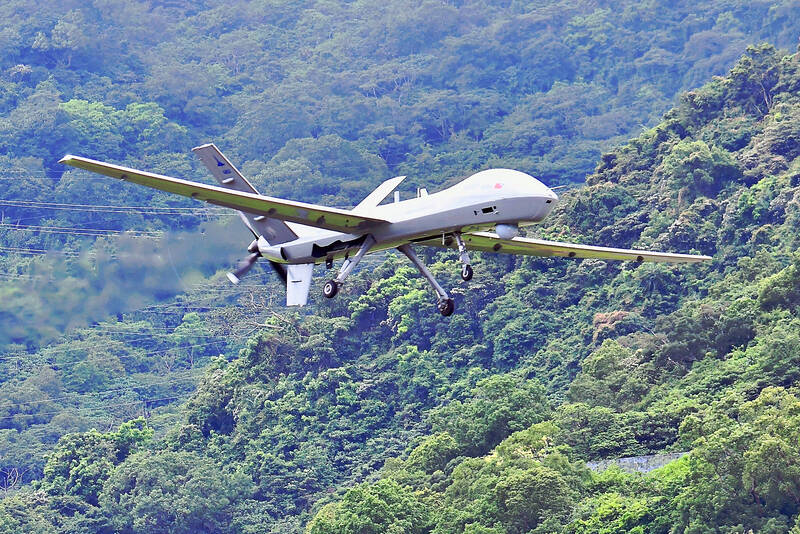The indigenous uncrewed combat aerial vehicle (UCAV) Teng Yun 2 has not passed its combat readiness testing phase, with initial results showing its design has room for improvement, a source with knowledge of the matter said yesterday.
Further combat testing would be conducted after making hardware and software changes to improve the drone’s performance, the source said.
The Teng Yun 2 combat and reconnaissance drone, or “Cloud Rider” (騰雲二型), developed by the Chungshan Institute of Science and Technology, evolved from a first-generation drone that did not meet the military’s needs.

Photo: Yu Tai-lang, Taipei Times
The second-generation version is a long-endurance, satellite-guided drone that has a new engine as well as an improved and enhanced configuration and flight control system compared with the first-generation prototype.
It is capable of autonomous takeoffs and landings, is equipped with satellite navigation, and can stay in the air for nearly 24 hours, the source said.
The new version completed its first-phase flight tests in March 2022, and the institute trained air force members to use it in January and February last year before it entered combat readiness testing in March.
Initial combat testing results indicated that there was still room for improvement, the source said, adding that efforts to improve the design of the new version are under way and that further tests would be carried out soon.
The combat readiness testing phase is the final hurdle the drone has to clear before it can be manufactured for military use.
Under the Ministry of National Defense’s five-step process for developing weapons, drones need to make it through an initial conceptual design stage, an engineering development stage, initial weapon testing, and combat readiness testing before they can enter mass production.

US climber Alex Honnold is to attempt to scale Taipei 101 without a rope and harness in a live Netflix special on Jan. 24, the streaming platform announced on Wednesday. Accounting for the time difference, the two-hour broadcast of Honnold’s climb, called Skyscraper Live, is to air on Jan. 23 in the US, Netflix said in a statement. Honnold, 40, was the first person ever to free solo climb the 900m El Capitan rock formation in Yosemite National Park — a feat that was recorded and later made into the 2018 documentary film Free Solo. Netflix previewed Skyscraper Live in October, after videos

Starting on Jan. 1, YouBike riders must have insurance to use the service, and a six-month trial of NT$5 coupons under certain conditions would be implemented to balance bike shortages, a joint statement from transportation departments across Taipei, New Taipei City and Taoyuan announced yesterday. The rental bike system operator said that coupons would be offered to riders to rent bikes from full stations, for riders who take out an electric-assisted bike from a full station, and for riders who return a bike to an empty station. All riders with YouBike accounts are automatically eligible for the program, and each membership account

A classified Pentagon-produced, multiyear assessment — the Overmatch brief — highlighted unreported Chinese capabilities to destroy US military assets and identified US supply chain choke points, painting a disturbing picture of waning US military might, a New York Times editorial published on Monday said. US Secretary of Defense Pete Hegseth’s comments in November last year that “we lose every time” in Pentagon-conducted war games pitting the US against China further highlighted the uncertainty about the US’ capability to intervene in the event of a Chinese invasion of Taiwan. “It shows the Pentagon’s overreliance on expensive, vulnerable weapons as adversaries field cheap, technologically

NUMBERs IMBALANCE: More than 4 million Taiwanese have visited China this year, while only about half a million Chinese have visited here Beijing has yet to respond to Taiwan’s requests for negotiation over matters related to the recovery of cross-strait tourism, the Tourism Administration said yesterday. Taiwan’s tourism authority issued the statement after Chinese-language daily the China Times reported yesterday that the government’s policy of banning group tours to China does not stop Taiwanese from visiting the country. As of October, more than 4.2 million had traveled to China this year, exceeding last year. Beijing estimated the number of Taiwanese tourists in China could reach 4.5 million this year. By contrast, only 500,000 Chinese tourists are expected in Taiwan, the report said. The report